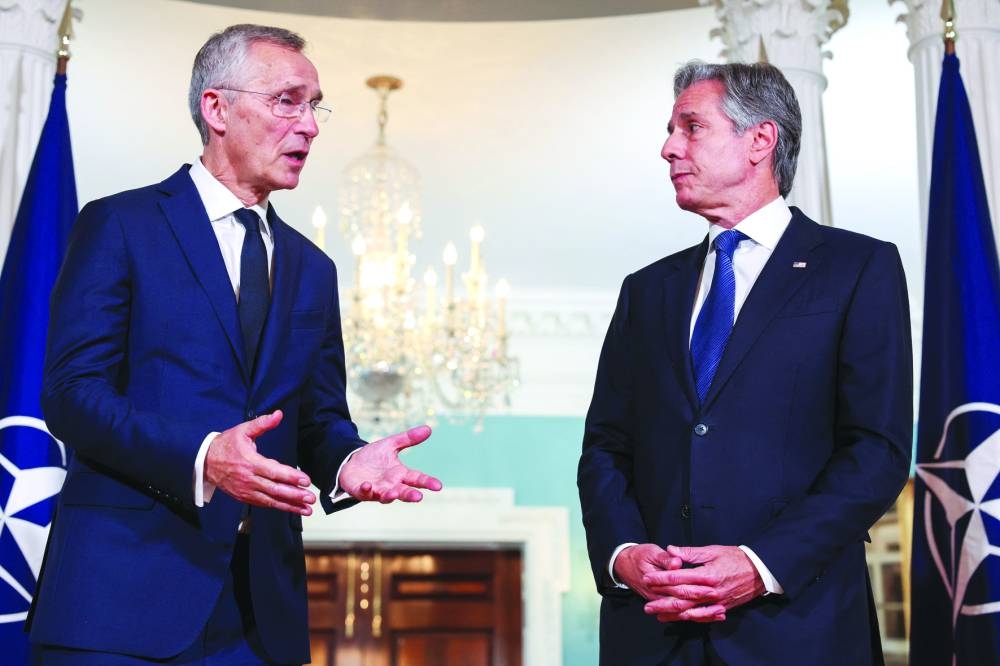US President Joe Biden geared yesterday to kick off a Nato summit in Washington aimed at showing resolve against Russia and support for Ukraine — but the meeting was being overshadowed by his fight for political survival.
The 81-year-old leader will try to use the three days of pomp marking Nato’s 75th anniversary to reassure allies over US leadership, and his own ability to govern, as calls grow for him to quit the fight for a second term in office.
Biden has so far defied pressure from some within his party to step aside, after a disastrous TV debate against election rival Donald Trump last month fuelled fears that he lacks mental acuity and physical fitness.
The US president was set to open the summit with a speech in the room where Nato’s founding treaty was signed in 1949 and expected to emphasise how the alliance has been strengthened on his watch.
Other leaders appeared keen to rally around their host, with German Chancellor Olaf Scholz insisting as he set off from Berlin yesterday that he was “not concerned” by the president’s fitness.
But as doubts swirl over Biden, the 32-nation alliance is nervously eyeing a potential return to the White House by Trump after elections in November.
On the campaign trail, the volatile ex-reality TV star has threatened to blow apart the principle of mutual self-defence that has underpinned Nato since it was founded in the wake of World War II.
It’s not just the United States, however, that faces political questions.
French President Emmanuel Macron is struggling to form a government after divisive elections, new British Prime Minister Keir Starmer makes his first international outing, and Hungary’s premier Viktor Orban flies in after a much-criticised meeting with Russian leader Vladimir Putin.
While they wrestle with the minefield of US politics, Nato leaders will have to show they haven’t been distracted from the reality of the battlefield in Ukraine.
Ukrainian President Volodymyr Zelensky arrived yesterday expecting to secure additional Patriot advanced air defence systems that he has been begging his backers to send for months to stave off Russian attacks. White House said yesterday he is also set to meet Biden separately.
His war-torn country’s vulnerability to Moscow’s missiles was cruelly exposed by a strike Monday on a children’s hospital in Kyiv.
“We are fighting for more air defence systems for Ukraine, and I’m confident we will succeed,” Zelensky said after touching down in Washington.
“We urge decisive actions from the US and Europe — actions that will strengthen our warriors.”
The Kremlin said it was following the summit “with the greatest attention... the rhetoric at the talks and the decisions that will be taken and put on paper.”
The promise of more weaponry is set to be the biggest win the Ukrainian leader will get as his troops struggle to hold ground two and a half years into Russia’s invasion.
Worried about dragging Nato closer to war with Russia, the United States and Germany have shut down any talk of giving Ukraine a clear invitation to join their alliance.
Instead diplomats say Kyiv’s path to eventual membership may be described as “irreversible” in the summit declaration and say the country is on a “bridge” to joining. Nato members will vow to keep supporting Ukraine at the rate they have been so far since Moscow invaded — roughly €40bn annually — for at least another year.
They will also agree the alliance will take more control of co-ordinating weapon deliveries to Ukraine from the US military in a move to help insulate supplies from any changes in Washington if Trump wins the election.
European countries in Nato have ramped up defence spending in response to Russia’s war — and the alliance is showcasing the rises to make the case to Washington that it isn’t carrying all the financial burden.
Nato chief Jens Stoltenberg said allies would sign a pledge to spend more on weaponry in a bid to get defence firms to ratchet up capacity.
While Nato views Russia as its main threat, it is also paying greater attention to the challenge from China and accuses Beijing of playing a key role in keeping Moscow’s war effort going by supplying tech to the Kremlin’s military.
The leaders of Australia, Japan, New Zealand and South Korea will come to Washington to bolster ties with the alliance.
China’s foreign ministry hit out at the “smear and attacks” against Beijing from Nato and said the alliance was seeking an excuse to expand its influence in the Asia-Pacific region.

US Secretary of State Antony Blinken (right) holds a bilateral meeting with Nato Secretary-General Jens Stoltenberg at the State Department on the sidelines of the Nato summit in Washington yesterday. (Reuters)
